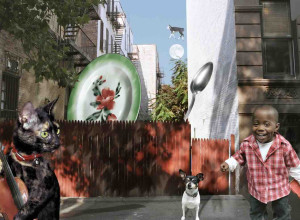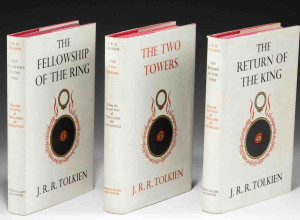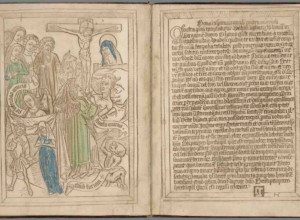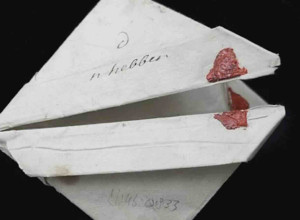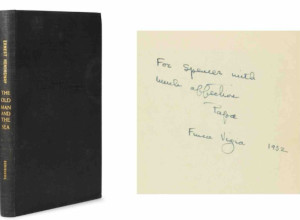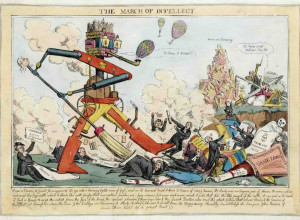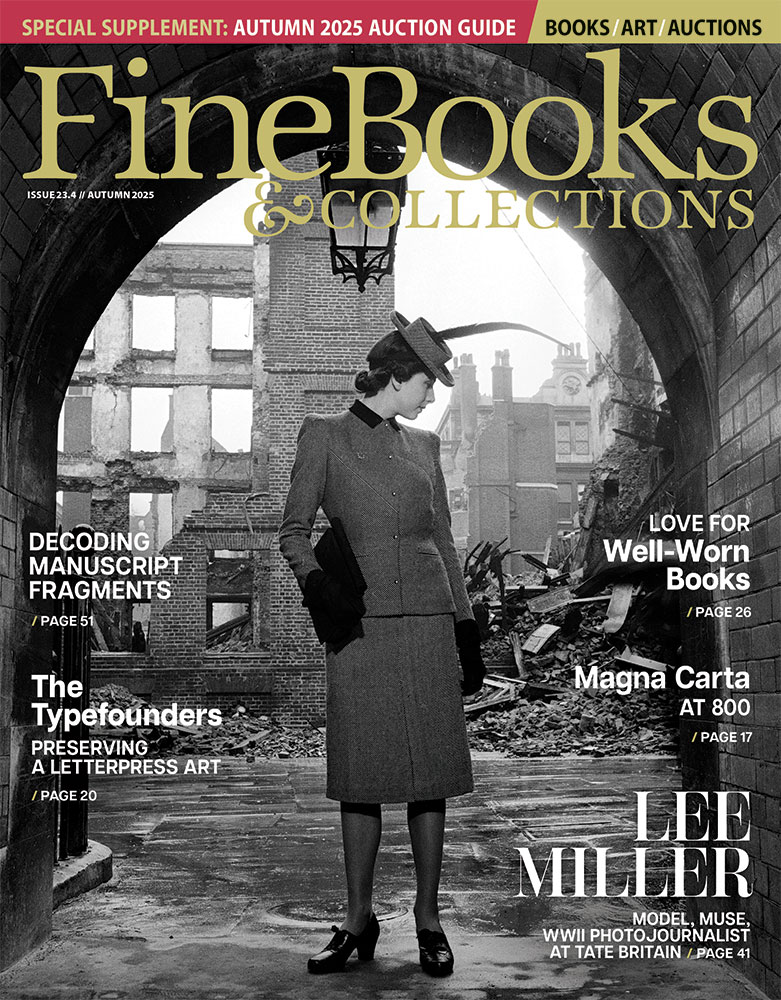Bright Young Things: Jonathan Smalter
Our series profiling the next generation of antiquarian booksellers continues today with Jonathan Smalter, proprietor of Yesterday's Muse, in Webster, New York. Jonathan just released his first catalogue, which is available to download here. NP: How did you get started as a bookseller?
NP: How did you get started as a bookseller?
JS: I began working in a used bookstore when I was 17, but I think my love of books started much earlier than that. The first memory I have is of my grandmother teaching me to properly turn the pages of a book. My first book-related job was all data entry, and I had a chance to handle a lot of interesting books. I was hooked.
NP: When did you open Yesterday's Muse?
JS: Yesterday's Muse has been in operation since 2002, when I literally began selling books out of my closet during college. I've been making a living doing this full-time since college, and opened a brick-and-mortar shop towards the end of 2008.
 NP: How did you get started as a bookseller?
NP: How did you get started as a bookseller? JS: I began working in a used bookstore when I was 17, but I think my love of books started much earlier than that. The first memory I have is of my grandmother teaching me to properly turn the pages of a book. My first book-related job was all data entry, and I had a chance to handle a lot of interesting books. I was hooked.
NP: When did you open Yesterday's Muse?
JS: Yesterday's Muse has been in operation since 2002, when I literally began selling books out of my closet during college. I've been making a living doing this full-time since college, and opened a brick-and-mortar shop towards the end of 2008.
NP: What does Yesterday's Muse specialize in?
JS: For the majority of my time as a bookseller, I've been very much a generalist, but I am beginning to hone in on a few areas of interest. Right now the two I'm particularly focused on are military fortifications (specifically castles) and utopian/dystopian literature. The catalog I'm releasing soon shows the beginnings of a concentration on these subjects.
NP: When you first started selling books, you were an online retailer. What propelled you to open a brick-and-mortar shop?
JS: Having worked in a used bookstore previously, I was able to witness a lot of the day-to-day activity, and I realized a store was a great source for new stock, and a way to generate repeat business. Online sales are largely one-time interactions, and that isn't the sort of business I'm interested in doing. I find it much more rewarding to sell a book to an existing customer and see their reaction, and know I helped them find it. I probably base a few too many of my business decisions on vague philosophical reasoning like that, but it helps me enjoy what I do.
NP: Tell us about your shop:
JS: My shop is about 2500 square feet, located on Main Street in the town I grew up in (Webster, NY, just east of Rochester). I have about 8000 books on site, and about 12000 in a warehouse just a few minutes away. Right now I stock everything from $2 paperbacks to scarce $5000 items, though I'm quickly moving away from the low end. I take in books for cash or store credit, I do some book repair, and I offer a book search service. I also have two resident cats.
NP: Have you found it challenging to maintain an open shop in the age of online bookselling?
JS: I am in the unique position of having done online only first, and then both in tandem. I've arranged my store in such a way that all the data entry and order fulfillment for the online business are done in-store. This allows me to employ someone to both mind the shop and work on the online business, which I knew would be necessary to stay competitive. Instead of being an anchor that prevents me from moving about, the store is basically an office that has revenue potential. The challenges I face having an open shop are, I think, the same challenges I would face without one--acquiring quality stock; generating repeat business; and maintaining sufficient cash flow. I think the open shop has helped with the first two, and as a result I don't think it's been hurtful to the third.
NP: Favorite or most interesting book (or etc) you've handled?
JS: I think at this point my answer would be the early 17th century Geneva Bible I recently took on consignment. It is in a contemporary binding, and researching it was a lot of fun. Anything that teaches me new things I find fascinating. I find that, for the most part, what topic a book is on has very little to do with how compelling I find it. What interests me is significance, whether it's an association with a famous entertainer, a first-hand account of the Revolutionary War, or an interesting inscription by the author.
NP: What do you personally collect?
JS: I must admit that I do not have an impressive personal collection. I mostly live vicariously through my inventory. I do have an assortment of works by Ray Bradbury and Ursula Le Guin, and when I find Chinese art or literature that won't sell for as much as I think it should I tend to keep it. That being said, I have better items that fit all these descriptions in my inventory than in my own library.
NP: Any thoughts on the future of the book trade; particularly on the future of brick-and-mortar shops?
JS: The future of the book trade is what we want it to be. As has always been the case, booksellers must adapt to the trends of the market. What we mustn't do is adapt to the death of the market, which is what so many seem to be doing these days. I have very little patience for those who show no faith in their own trade. Will there be booksellers who try and fail? Absolutely. But that is nothing new. There will always be a place for those selling desirable books.
NP: Tell us about assembling your first catalog and how to get a copy:
JS: I have been hard at work on my Catalog 1, and I am happy to say it is now complete. It has been a whirlwind experience, and I had to learn a lot of things on the quick. I would recommend it to any bookseller, though--it is an excellent exercise in displaying what is desirable about your books quickly and effectively. This first catalog features the beginnings of two newly minted specialties of mine: castles & fortifications; and utopian/dystopian literature. Each of these are represented by an array of interesting items, but there is also something for just about everyone, from children's books to signed copies and modern first editions. You can request a print copy or a digital version by e-mailing me at yesterdays.muse@gmail.com. It is available in digital form at www.websterbookstore.com.
JS: For the majority of my time as a bookseller, I've been very much a generalist, but I am beginning to hone in on a few areas of interest. Right now the two I'm particularly focused on are military fortifications (specifically castles) and utopian/dystopian literature. The catalog I'm releasing soon shows the beginnings of a concentration on these subjects.
NP: When you first started selling books, you were an online retailer. What propelled you to open a brick-and-mortar shop?
JS: Having worked in a used bookstore previously, I was able to witness a lot of the day-to-day activity, and I realized a store was a great source for new stock, and a way to generate repeat business. Online sales are largely one-time interactions, and that isn't the sort of business I'm interested in doing. I find it much more rewarding to sell a book to an existing customer and see their reaction, and know I helped them find it. I probably base a few too many of my business decisions on vague philosophical reasoning like that, but it helps me enjoy what I do.
NP: Tell us about your shop:
JS: My shop is about 2500 square feet, located on Main Street in the town I grew up in (Webster, NY, just east of Rochester). I have about 8000 books on site, and about 12000 in a warehouse just a few minutes away. Right now I stock everything from $2 paperbacks to scarce $5000 items, though I'm quickly moving away from the low end. I take in books for cash or store credit, I do some book repair, and I offer a book search service. I also have two resident cats.
NP: Have you found it challenging to maintain an open shop in the age of online bookselling?
JS: I am in the unique position of having done online only first, and then both in tandem. I've arranged my store in such a way that all the data entry and order fulfillment for the online business are done in-store. This allows me to employ someone to both mind the shop and work on the online business, which I knew would be necessary to stay competitive. Instead of being an anchor that prevents me from moving about, the store is basically an office that has revenue potential. The challenges I face having an open shop are, I think, the same challenges I would face without one--acquiring quality stock; generating repeat business; and maintaining sufficient cash flow. I think the open shop has helped with the first two, and as a result I don't think it's been hurtful to the third.
NP: Favorite or most interesting book (or etc) you've handled?
JS: I think at this point my answer would be the early 17th century Geneva Bible I recently took on consignment. It is in a contemporary binding, and researching it was a lot of fun. Anything that teaches me new things I find fascinating. I find that, for the most part, what topic a book is on has very little to do with how compelling I find it. What interests me is significance, whether it's an association with a famous entertainer, a first-hand account of the Revolutionary War, or an interesting inscription by the author.
NP: What do you personally collect?
JS: I must admit that I do not have an impressive personal collection. I mostly live vicariously through my inventory. I do have an assortment of works by Ray Bradbury and Ursula Le Guin, and when I find Chinese art or literature that won't sell for as much as I think it should I tend to keep it. That being said, I have better items that fit all these descriptions in my inventory than in my own library.
NP: Any thoughts on the future of the book trade; particularly on the future of brick-and-mortar shops?
JS: The future of the book trade is what we want it to be. As has always been the case, booksellers must adapt to the trends of the market. What we mustn't do is adapt to the death of the market, which is what so many seem to be doing these days. I have very little patience for those who show no faith in their own trade. Will there be booksellers who try and fail? Absolutely. But that is nothing new. There will always be a place for those selling desirable books.
NP: Tell us about assembling your first catalog and how to get a copy:
JS: I have been hard at work on my Catalog 1, and I am happy to say it is now complete. It has been a whirlwind experience, and I had to learn a lot of things on the quick. I would recommend it to any bookseller, though--it is an excellent exercise in displaying what is desirable about your books quickly and effectively. This first catalog features the beginnings of two newly minted specialties of mine: castles & fortifications; and utopian/dystopian literature. Each of these are represented by an array of interesting items, but there is also something for just about everyone, from children's books to signed copies and modern first editions. You can request a print copy or a digital version by e-mailing me at yesterdays.muse@gmail.com. It is available in digital form at www.websterbookstore.com.





